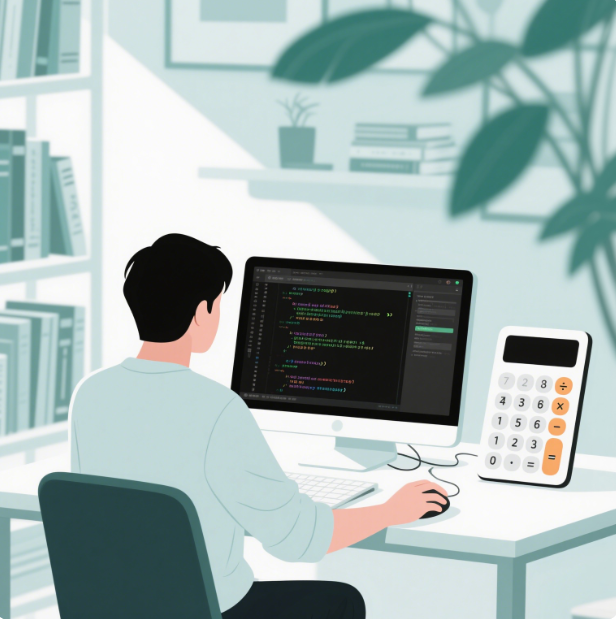Embarking on the journey of coding can feel like stepping into a vast, uncharted territory. As a beginner, the abundance of concepts, languages, and frameworks can be overwhelming. But fear not! One of the most effective ways to level up your coding skills quickly is by diving headfirst into practical projects. These projects serve as your guides, helping you understand how theoretical knowledge translates into real – world applications. Here are five coding projects that every beginner should try to accelerate their learning curve and transform from a novice coder to a confident programmer.
1. The Humble Calculator: Building the Foundation
The calculator is a classic starting point for any coding beginner. It might seem simple, but beneath its straightforward exterior lies a wealth of learning opportunities. When you set out to code a calculator, you’ll get hands – on experience with variables, data types, and basic arithmetic operations. Whether you’re using Python, JavaScript, or Java, creating a calculator forces you to understand how to take user input, perform calculations, and display the results accurately.
Imagine you’re a budding coder who loves numbers. You decide to build a calculator to help with your daily math tasks. As you write the code, you encounter challenges like handling different types of input, such as integers and decimals, and dealing with operator precedence. Solving these problems not only deepens your understanding of the programming language but also hones your logical thinking skills. By the time you’ve completed your calculator, you’ll have a solid foundation upon which you can build more complex projects.
2. The Interactive To – Do List: Organizing Your Digital Life
In our busy lives, keeping track of tasks is essential. Creating an interactive to – do list application is not only a fun project but also a practical one. With this project, you’ll learn about lists, loops, and conditional statements. You’ll be able to add tasks, mark them as completed, and even delete them when they’re no longer relevant.
Let’s say you’re a student juggling multiple assignments, extracurricular activities, and social commitments. You code a to – do list app to manage your schedule better. As you develop the app, you’ll explore how to store data, perhaps using arrays or objects, and how to display it in an organized manner. You might even add features like setting due dates or priorities for each task. This project not only improves your coding skills but also gives you a useful tool to manage your life more efficiently.
3. The Personal Website: Showcasing Your Creativity
Building a personal website is a great way to combine coding with creativity. You’ll get to work with HTML, CSS, and potentially JavaScript to create a digital space that represents you. From designing the layout and choosing colors to adding interactive elements, this project allows you to express your personality while learning web development fundamentals.
Picture yourself as an artist looking to share your work with the world. You decide to build a website to showcase your paintings, drawings, and sculptures. As you code the website, you learn how to structure web pages using HTML tags, style them with CSS to make them visually appealing, and add functionality like image sliders or contact forms with JavaScript. By the end of this project, you’ll not only have a portfolio to present to potential clients or employers but also a deeper understanding of how the web works.
4. The Simple Game: Adding Fun to Learning
Who said learning to code couldn’t be fun? Developing a simple game, such as a text – based adventure game or a guessing game, is an excellent way to engage your creativity and learn programming concepts simultaneously. When creating a game, you’ll encounter concepts like functions, control flow, and user interaction.
For example, you might decide to code a guessing game where the player has to guess a number between 1 and 100. You’ll write code to generate the random number, take the player’s input, and provide hints based on whether the guess is too high or too low. As you add more features to the game, like keeping score or adding multiple levels, you’ll expand your coding knowledge and improve your problem – solving abilities. This project turns learning into an exciting adventure.
5. The Data Analyzer: Unveiling Insights
In today’s data – driven world, understanding how to analyze data is a valuable skill. Creating a simple data analyzer project allows you to work with data structures, file handling, and basic statistical operations. You can start by analyzing a small dataset, such as a list of student grades or sales figures.
Suppose you’re interested in business and want to learn how to make sense of data. You take a dataset of monthly sales from a local store and code a program to calculate the total sales, average sales per month, and identify the months with the highest and lowest sales. As you work on this project, you’ll learn how to read data from files, manipulate it, and present the results in a meaningful way. This project not only enhances your coding skills but also gives you a taste of data analysis, a field that is in high demand.
In conclusion, these five coding projects are like stepping stones on your path to coding mastery. Each project offers a unique learning experience, helping you develop different skills and gain confidence in your abilities. So, roll up your sleeves, choose a project that interests you, and start coding. With each line of code you write, you’ll be one step closer to becoming a proficient programmer.



